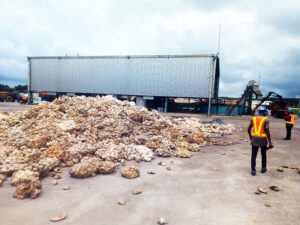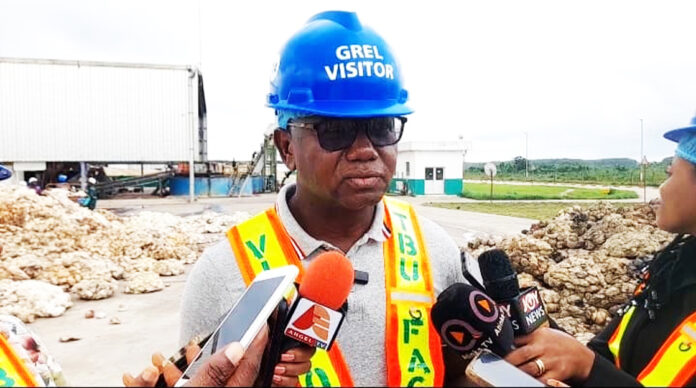The General Agriculture Workers Union (GAWU) of Trade Union Congress has observed that government policy on the rubber industry appears to be destroying the industry. This policy, according to the union, allows side buyers to openly purchase cup lumps materials and export them without paying taxes.
GAWU is, therefore, appealing to government to take immediate steps to ban the export of cuplumps materials in other to save the rubber industry and same save jobs.
Speaking to journalist at the tour of the plantation site of the Ghana Rubber Estate Limited (GREL), following the destruction of about 40 hectares of rubber farm plantation, the General Secretary of GAWU, Edward T. Kareweh, stressed that “government must ban export of cuplumps materials because we don’t even have enough.
“Why do we export-we must first produce to feed ourselves, produce to feed industry then we export the excess.”
He further stressed that it was important for Government to ban the export of cuplumps materials because jobs were at stake. He indicated that over 70 thousand jobs were at stake if the rubber industry, particularly GREL, goes down.

The call by GAWU comes at a time GREL was struggling to find raw materials to feed its 25milion Euro processing factory. The factory was opened in 2020 and is under the 1D1F initiative.
GREL says it needs 113 tonnage of cuplumps materials for processing at its factory on daily basis. But due to shortage of cuplums materials, it intermittently shuts down in other to go and search for raw materials.
Acting Factory Manager, Sampson Boafo, told the GAWU delegation and news men that the factory was shut down because there was no raw materials.
“This is the second time we have shut down because of lack of raw materials”. The processing capacity of the factory, he indicated, is 113 tonnes daily and “we are likely to close down again next week”.
He conceded it was difficult to gather 113 tonnes of raw materials because of the infiltration of side buyers in the rubber market.
This, he observed, has come at a cost to the company, because apart from the daily allowances workers get whilst the factory is working, the machines are also at risk of getting shut down.
The loan the company took in establishing the new factory was also likely to be affected.
It is as a result of this that GAWU is appealing to government to regulate the rubber industry by immediately taking steps to ban the purchase and export of cuplumps materials.
General Secretary of GAWU, Edward Kareweh, mentioned that the capacity of rubber producers in Ghana stood at 100,000 but has got capacity to produce 140,000.
“It means we should be importing to feed our industry”.
However, what has accounted for the gap was because government policy appeared to be destroying our industry because anybody can buy and export cuplumps materials.
“The side buyers go to buy from the farmers, they do not support to grow the rubber, either do they pay workers. However, GREL supports the farmers to grow the rubber and pay workers,” he said, adding that the company has created direct employment of 4,000 people and indirect employment of 50,000.
The GAWU General Secretary explained that his outfit was concerned about the activitiesof side buyers and lack of raw materials because the company has invested so much in its latest processing factory.
A total amount of 25million euros, according to him, had been invested in the new factory.
Unfortunately, Mr. Kareweh mentioned that “all these investments will go into the drain. The factory as we talk now has been closed down.”
He continued, “I am raising this point because government recently raised $200m from the World Bank to support tree crop areas. So if in one vein, you can go and take a loan to support the growth and growing of trees and in another vein, you sit aloof and allow those trees that are already existing to be destroyed, you sit aloof and allow those who do not pay taxes to buy rubber and export, and you deny the country of revenue and opportunity to create jobs.
“What we are calling for is that government must immediately ban the export of cuplumps materials”.
Meanwhile, GAWU executives have inspected the extent of destruction caused to GREL, following the cutting down of about 40 hectares of rubber trees.
A total of about 100,000 trees were cut down by some criminals.The trees in question were replanted between 2021 and 2022 and GREL says it spent over 100,000 euros in the replanting exercise.










